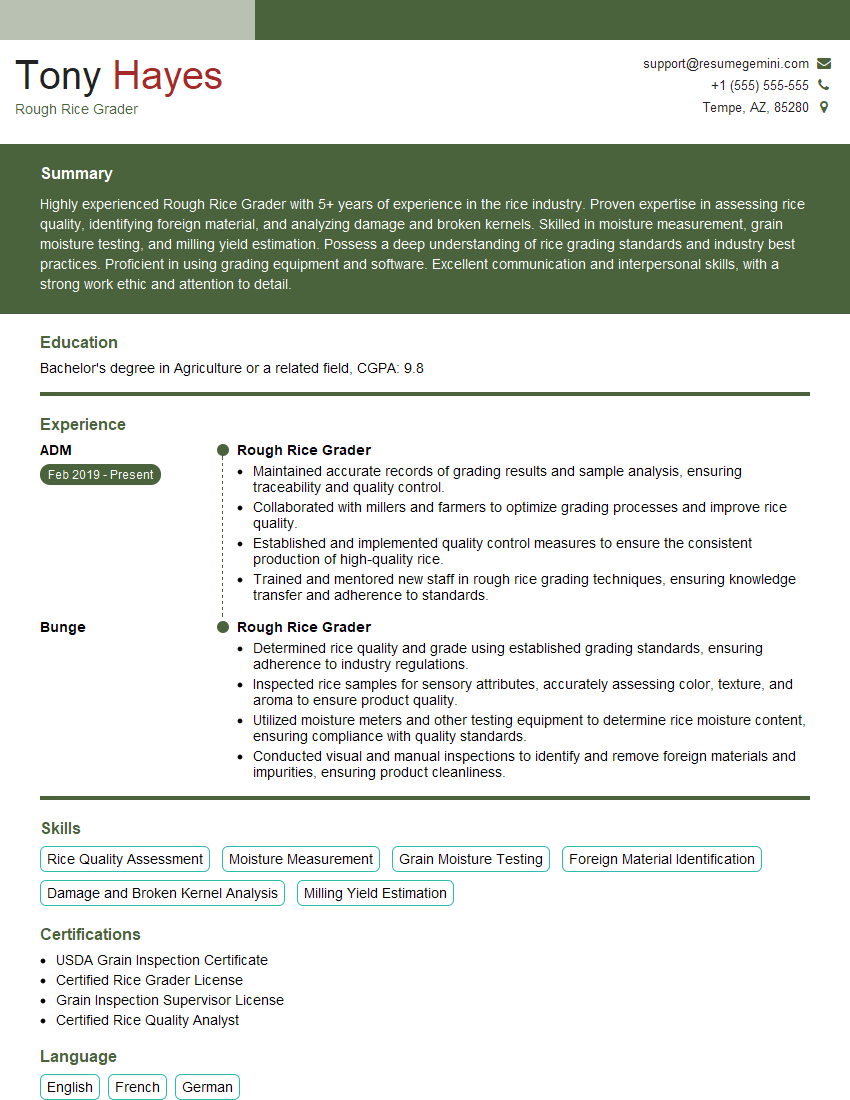Are you a seasoned Rough Rice Grader seeking a new career path? Discover our professionally built Rough Rice Grader Resume Template. This time-saving tool provides a solid foundation for your job search. Simply click “Edit Resume” to customize it with your unique experiences and achievements. Customize fonts and colors to match your personal style and increase your chances of landing your dream job. Explore more Resume Templates for additional options.

Tony Hayes
Rough Rice Grader
Summary
Highly experienced Rough Rice Grader with 5+ years of experience in the rice industry. Proven expertise in assessing rice quality, identifying foreign material, and analyzing damage and broken kernels. Skilled in moisture measurement, grain moisture testing, and milling yield estimation. Possess a deep understanding of rice grading standards and industry best practices. Proficient in using grading equipment and software. Excellent communication and interpersonal skills, with a strong work ethic and attention to detail.
Education
Bachelor’s degree in Agriculture or a related field
January 2015
Skills
- Rice Quality Assessment
- Moisture Measurement
- Grain Moisture Testing
- Foreign Material Identification
- Damage and Broken Kernel Analysis
- Milling Yield Estimation
Work Experience
Rough Rice Grader
- Maintained accurate records of grading results and sample analysis, ensuring traceability and quality control.
- Collaborated with millers and farmers to optimize grading processes and improve rice quality.
- Established and implemented quality control measures to ensure the consistent production of high-quality rice.
- Trained and mentored new staff in rough rice grading techniques, ensuring knowledge transfer and adherence to standards.
Rough Rice Grader
- Determined rice quality and grade using established grading standards, ensuring adherence to industry regulations.
- Inspected rice samples for sensory attributes, accurately assessing color, texture, and aroma to ensure product quality.
- Utilized moisture meters and other testing equipment to determine rice moisture content, ensuring compliance with quality standards.
- Conducted visual and manual inspections to identify and remove foreign materials and impurities, ensuring product cleanliness.
Certificates
- USDA Grain Inspection Certificate
- Certified Rice Grader License
- Grain Inspection Supervisor License
- Certified Rice Quality Analyst
Languages
- English
- French
- German
Career Expert Tips:
- Select the ideal resume template to showcase your professional experience effectively.
- Master the art of resume writing to highlight your unique qualifications and achievements.
- Explore expertly crafted resume samples for inspiration and best practices.
- Build your best resume for free this new year with ResumeGemini. Enjoy exclusive discounts on ATS optimized resume templates.
How To Write Resume For Rough Rice Grader
- Highlight your experience and skills in rice grading, moisture measurement, and quality assessment.
- Showcase your knowledge of industry standards and best practices for rice grading.
- Provide specific examples of your contributions to improving rice quality and reducing costs.
- Use strong action verbs and quantify your accomplishments whenever possible.
- Proofread your resume carefully for any errors in grammar or spelling.
Essential Experience Highlights for a Strong Rough Rice Grader Resume
- Assess the quality of rough rice using various grading techniques and equipment.
- Measure rice moisture content using industry-standard methods.
- Identify foreign material, such as stones, sticks, and other contaminants, to ensure product quality.
- Inspect rice for damage and broken kernels to assess the milling yield.
- Estimate the milling yield by analyzing rice quality and moisture content.
- Maintain accurate records of grading results and communicate findings to internal and external stakeholders.
- Stay updated on the latest industry standards and best practices for rice grading.
Frequently Asked Questions (FAQ’s) For Rough Rice Grader
What is the role of a Rough Rice Grader?
A Rough Rice Grader assesses the quality of rough rice, identifies foreign material, and analyzes damage and broken kernels to ensure product quality.
What are the key skills required for a Rough Rice Grader?
Key skills include rice quality assessment, moisture measurement, grain moisture testing, foreign material identification, damage and broken kernel analysis, and milling yield estimation.
What is the career path for a Rough Rice Grader?
With experience, Rough Rice Graders can advance to roles such as Quality Control Manager, Grain Inspector, or Rice Buyer.
What is the job outlook for Rough Rice Graders?
The job outlook for Rough Rice Graders is expected to be positive due to the increasing demand for high-quality rice and the need for trained professionals to ensure product quality.
What is the average salary for a Rough Rice Grader?
The average salary for a Rough Rice Grader can vary depending on experience, location, and company size, but it typically ranges between $40,000 to $60,000 per year.
What are the challenges faced by Rough Rice Graders?
Rough Rice Graders may face challenges related to inconsistent rice quality, the presence of foreign material, and the need to stay updated on industry standards and best practices.
What are the benefits of being a Rough Rice Grader?
Benefits of being a Rough Rice Grader include job security, opportunities for career advancement, and the satisfaction of ensuring the quality of a staple food for many people around the world.
What is the work environment for a Rough Rice Grader?
Rough Rice Graders typically work in grain elevators, warehouses, or rice mills, and may be exposed to dust, noise, and heavy machinery.